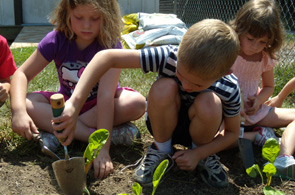A (Fun!) Lesson in Farm to School
Guest post courtesy of the Appalachian Sustainable Agriculture Project
To learn more about ASAP, watch their Inspired video.
 In 2001, there were six pilot Farm to School programs in the U.S. Today, there are programs in all 50 states and in more than 9,000 schools. Why? Because Farm to School can make big positive impacts when it comes to children’s health and education, and even when it comes to our communities and economies.
In 2001, there were six pilot Farm to School programs in the U.S. Today, there are programs in all 50 states and in more than 9,000 schools. Why? Because Farm to School can make big positive impacts when it comes to children’s health and education, and even when it comes to our communities and economies.
What exactly is Farm to School? Farm to School programming includes school gardens, local food cooking classes and demonstrations, farm field trips, and the serving of local food in school cafeterias. These programs are based on the premise that students will make healthy eating choices, such as choosing fruits and vegetables, if they have positive experiences and relationships with the source of their food. And now, preschools are coming on board, offering these same opportunities to the youngest of our children.
These experiences (gardening, cooking classes, etc. as mentioned above) are not only critical components of health and obesity prevention strategies, but also important teaching tools that meaningfully engage students while providing a viable market opportunity for local farmers and building connections to agricultural heritage and rural communities.
All of us at ASAP have seen these benefits first-hand, whether in our work with farmers or schools. In the spirit of this inspired campaign, we wanted to share our stories about the importance and impact of Farm to School:
“For many farms, the school system is the largest buyer of food in their rural county, so it’s a natural match to think about selling fruits and vegetables there. While there can barriers in terms of season, pricing, and requirements, some farmers are working out how to overcome the obstacles. One farmer we work with, Skipper Russell, started selling vegetables to Haywood County Schools last year. The school is now one vital piece of his farm’s marketing plan!” –Peter Marks, program director
“I recently led a classroom cooking demonstration where we made smoothies with local winter spinach. I shared with the elementary students that winter spinach is special and tastes so delicious because it protects itself from frost by creating a coat of sugar. In the middle of cooking, I looked over and saw two girls sneaking into their prep bowls of spinach like it was a bag of candy! That’s the power of Farm to School. At the beginning of the year, they didn’t want to have anything to do with spinach. But after cooking with me eight or nine times, they were sneaking fruits and veggies! It’s all about the hands-on experience, connecting with the farmer who grew it, and about local food like winter spinach, a special thing you can’t get in the average grocery store.” –Anna Littman, program coordinator
“Farm to School engages children in a different way. I’ve seen students struggling with fractions finally have it click in when they are given the task of cutting a delicious local apple into eight equal pieces. The programming engages all of the senses and motivates children to explore and discover. Making a connection with a local farmer or chef makes food exciting and can inspire even the pickiest eater to try something new.”—Brittany Wager, program coordinator
We’re excited to continue witnessing and collecting these stories, and to continue watching and being a part of the Farm to School movement’s growth in our region and beyond. To learn more about where the movement is headed, check out the National Farm to School Network’s website at FarmtoSchool.org. (ASAP serves as the SE Regional Lead Agency for network and is one of three co-leads for a national Farm to Preschool initiative.) To keep up with our future plans—which include continuing and expanding our Farm to School Education project with college students studying to become teachers and dietitians, originally funded by the Blue Cross and Blue Shield of North Carolina Foundation; working with three dedicated Growing Minds Schools to fully integrate Farm to School programming, and lots more—visit our website, growing-minds.org, and follow us on Facebook (/asapconnections) and Twitter (@asapconnections.org).
